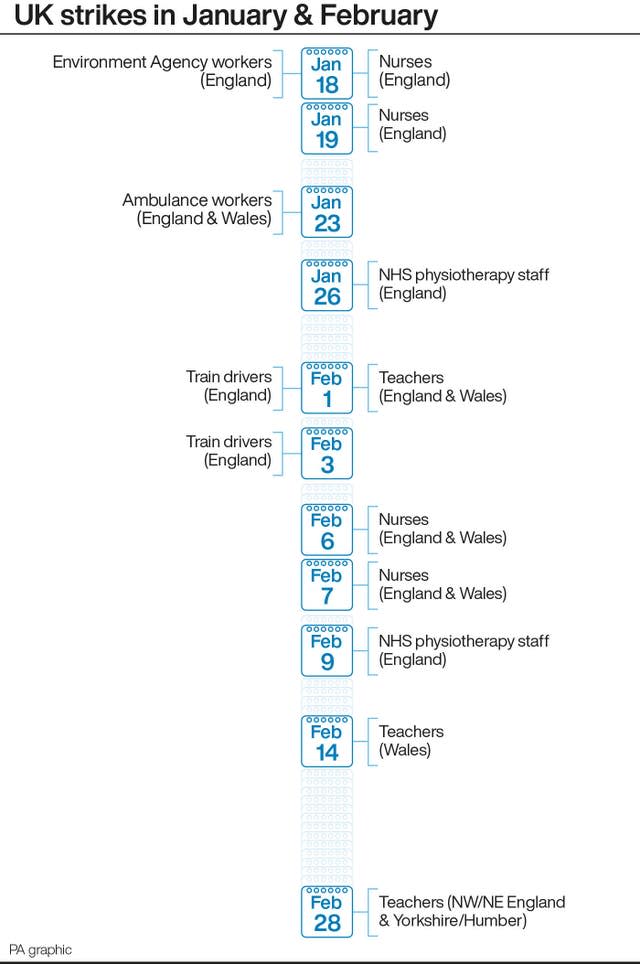‘No progress’ made in talks to avert teacher strikes, union leaders say
Union leaders have said “no progress” was made during a meeting with the Education Secretary in a bid to avert strike action over teachers’ pay.
Gillian Keegan held talks with the general secretaries of unions representing teachers and school leaders on Wednesday after walkouts in February and March were announced by the National Education Union (NEU).
Following the meeting, Mary Bousted, joint general secretary of the NEU, said: “At the moment we haven’t heard anything which leads me to believe we can avert this strike.”
The NEU plans to hold seven days of strike action in England and Wales in a dispute over pay – with the first on February 1 coinciding with walkouts by staff at universities, on the rail network and in Whitehall.

The union has said strike action could affect more than 23,000 schools.
Dr Bousted described the meeting with the Education Secretary on Wednesday morning as “good humoured” and “cordial” but she said “no real progress” was made on pay.
She added: “There is no indication at all that there is any more money on the table for the dispute for this year and there is no real indication that there will be a long-term correction in teachers’ pay, which has declined by 23% in real terms in the last 10 years.
“We are not in a position where we can begin negotiation because we have not heard there is more money on the table. For negotiations to work, that’s what has to happen.”
The Department for Education (DfE) has said discussions “will continue this week” ahead of the planned strike action.
Ms Keegan has said she will work with headteachers to make sure schools are open for as many children as possible but admitted she cannot guarantee there will be no closures.
Geoff Barton, general secretary of the Association of School and College Leaders (ASCL), who also attended the talks on Wednesday, said: “No progress was made at this meeting and we are no nearer a solution.”
He added that issues around teachers’ pay and workload remain “unresolved”.
Mr Barton said: “Nobody wants to see industrial action but it is not surprising that members of the NEU have voted in favour of strike action in these circumstances.
“Teacher shortages are a critical issue for virtually every school and college in the country, and are causing educational damage on a daily basis. The Government must do better for teachers, leaders and pupils.”
Updated guidance from the DfE suggests agency staff and volunteers could be used to cover classes on strike days, with schools expected to remain open where possible, although remote learning is an option and the most vulnerable pupils are to be given priority.
But on Tuesday, Paul Whiteman, general secretary of the National Association of Head Teachers, said schools could have to shut during walkouts if “staffing numbers are dangerously low”, and branded the guidance “at best naive”.
In England, the NAHT school leaders’ union failed to achieve the 50% ballot turnout required by law for its members to go out on strike over pay.
But the union is planning to ballot members again due to concern that the democratic process had been compromised amid postal disruption.
Mr Whiteman said: “We feel we have to go again.
“What we do have now is a period of time before the NEU take action and before we ballot again … where we can hopefully make some progress.
“We haven’t made any progress today but we are still talking, so there is always hope.”
The NASUWT teachers’ union has not ruled out holding another ballot on industrial action after a vote failed to reach the 50% turnout threshold.
Patrick Roach, general secretary of the NASUWT, said: “We are absolutely committed to pursuing and progressing our dispute.
“If it takes a further ballot to do that and get the Government to start to wake up and address the serious issues which our members have been raising, then so be it.”
A DfE spokesperson said: “Education Secretary Gillian Keegan held a further meeting with union leaders this morning, listening to their concerns and engaging in a constructive discussion around a broad range of issues.
“She reiterated that strike action would be highly damaging to children’s education, particularly following the disruption experienced over the past two years.
“Discussions will continue this week, ahead of the planned strike action.”


